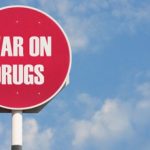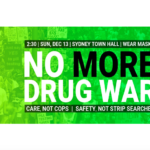The Light at the End of the Failed Drug War Is Growing Brighter

The 17th of June this year marked the 50th anniversary of the war on drugs. Launched by then US president Richard Nixon in 1971, the drug war led to the enhancement of law enforcement approaches to prohibition, and a heightened militarisation in dealing with Global South suppliers.
Nixon’s domestic affairs aide John Ehrlichman admitted decades later that rather than aiming to curb use, the drug war was designed to associate Black communities and the counterculture with illegal drugs in the public mind, and hence, provide an excuse for authorities to crack down on them.
While the war itself is only half a century old, drug prohibition had its inception with a series of international drug control treaties and domestic laws drafted early last century.
This was a process led by Washington, using British-imposed widespread opium dependency in China as the trigger.
So, it’s something of a full circle, to now see the US leading a decade-old global trend that’s seen recreational cannabis legalised in certain jurisdictions there and elsewhere, as well as a growing tendency towards the decriminalisation of the personal use and possession of all illegal drugs.
And in delivering its drug policy for its first year in office, the Biden administration showed that the shift towards deconstructing the edifice of global prohibition continues, with its two main priorities being “ensuring racial equity in drug policy and promoting harm reduction efforts”.
A health issue, not a crime
Released on 1 April 2021, the Biden administration’s policy outlines that since 2015, overdose deaths in the US have risen by 35 percent. And the president made clear that addressing drug-related deaths and widespread illicit substance dependency are his key aims.
The policy statement sets out that “the primary driver” behind overdose deaths has been “illicitly manufactured fentanyl and synthetic opioids other than methadone” but other illegal substances have also been involved, including cocaine and methamphetamine.
Seven broader policy priorities are listed, which include expanding and enhancing evidence-based treatment, harm reduction efforts, recovery support services and youth prevention, as well as addressing racial disparities in policy and a focus on reducing supply.
“Biden has also said that people should not be incarcerated for drug use but should be offered treatment instead,” the statement reads, and further adds an emphasis on eradicating “racial, gender, and economic inequities that currently exist in the criminal justice system”.
The path the White House has set is significant, as it leaves the “tough on drugs” rhetoric behind, and rather takes the approach of dealing with illicit substances chiefly as a health issue, and it also acknowledges and seeks to abolish the initial and ongoing prejudicial aspects of the drug war.
Ending discrimination
In its policy, the Biden administration states there’s “a clear and discernible need to take steps to advance racial equity issues resulting from current drug policy”, including incarceration for drug use, and it acknowledges historical drug war racial disparities, which have led to inequality and poverty.
Again, with a focus on harm reduction and rehabilitation, the White House points to “disparate access to care, differential treatment, and poorer health outcomes” that are impacting Black and Indigenous individuals and people of colour, who are dealing with substance use disorders.
The need for reform in this area is backed by the findings of a study, which reveal Black people with dependency issues take 4 to 5 years longer to enter treatment programs, than their white counterparts. And similar time lags are associated with Latinx communities seeking drug help.
The Biden policy also states that over its first year, the new administration will be identifying policy and budgetary gaps, establishing a criminal justice reform working group, and developing culturally sound harm reduction and treatment for “historically underserved communities”.
Same drug different time
The move to address the racist implications of drug laws is not new in the States.
A key racist policy the US had had in place for decades – which reveals that Nixon’s weaponisation of drug laws to target certain populations continued past his time in office – was contained within the Regan administration’s Anti-Drug Abuse Act of 1986.
These laws established a harsh system of mandatory sentencing based on the quantities of drugs an individual was found to be in possession of or had sold.
Yet, a lower bar was set for crack cocaine possession and sales, compared with those applying to powdered cocaine.
While this difference was subtly drafted, it held devastating implications on the ground, as it saw the mass incarceration of Black populations who favoured crack, whilst white populations who had a tendency towards the powdered form of the same drug received much more lenient sanctions.
Indeed, 5 grams of crack led to mandatory imprisonment, while it took 500 grams of powdered cocaine to trigger the same penalty.
Congress addressed this disparity in 2010, by reducing the initial 100 to 1 ratio down to 18 to 1.
But it wasn’t until then president Donald Trump made the reform retroactive in 2018, that those imprisoned under the earlier harsh crack quantity laws saw their sentences being dropped and going on to an earlier release.
This reform, however, has not served justice to some who were caught up under the bias of other laws in Reagan’s legislation, as the Trump-stacked conservative US Supreme Court ruled in June, that those imprisoned on low-level crack offences due to prior convictions, will simply remain in gaol.
Disparities down under
These days, “the failed drug war” is common parlance. But a decade ago, when a group of former heads of state and leading intellectuals known as the Global Commission on Drug Policy released its first report, which focused on the failure of the war on drugs, it was a breakthrough.
For its part, our nation has simply been following the United States lead on drug prohibition since the 1925 International Opium Convention was drafted in Geneva.
And while our first drug prohibition laws were racist – being enacted in 1857 to try and curb Chinese migration to this continent – right now, the racial disparities around illicit drug enforcement are more to do with targeted policing, than any carefully crafted laws.
The Guardian released figures in June last year, which showed that rather than applying a discretionary caution to First Nations peoples found with small amounts of cannabis in NSW, 82.5 percent of them were pursued in the courts over the five year period ending in 2017.
This was compared with only 52.29 percent of non-Indigenous people who were sent to court after being found with a small quantity of cannabis.
And while conviction rates between the two groups were similar, the 92 percent of First Nations people found guilty in court received harsher sentences than non-Indigenous defendants.
Light shining through
The push for drug law reform in this country is growing, as harm reduction advocates are no longer the sole voice calling for decriminalisation.
Over recent years, churches, legal associations, civil society groups, the NSW Coroners Court, and the Berejiklian-instigated ice inquiry have all recommended removing criminal sanctions for personal drug use and possession.
And the trends in the States are beginning to be mirrored over here in the laws of the nation’s capital.
Just like the move to lawful recreational cannabis now sees 19 US states having legalised it since 2012, the ACT made the personal use and possession of the plant lawful in Canberra back in January last year.
And the same Labor MP, Michael Pettersson, who instigated the cannabis legalisation laws, now has a bill before the ACT Legislative Assembly that seeks to decriminalise the use and personal possession of most illicit substances. And this has already been endorsed by a parliamentary review.
Oregon became the first US state to decriminalise all drugs in February this year. And now, other states, like Maine, Massachusetts, Rhode Island and Vermont, are contemplating their own laws.
And in a similar manner, it might be thought that the initial success of legal cannabis in Canberra, and the likely passing of decriminalisation laws in the capital early next year, might see these initiatives seep over the borders into state jurisdictions.







